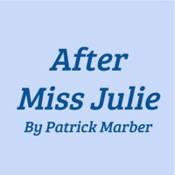
Overview
Synopsis
Patrick Marber's After Miss Julie adapts Strindberg's classic play and relocates it to the kitchen of an English country house in 1945. As the play opens, Winston Churchill's Conservative government has lost to the Labour Party and Labour’s landslide victory looks set to change the face of the British class system forever. Outside, the servants celebrate in the barn of the country house in which they are employed as servants. Can this victory mark a turning point in their fortunes, one where the working class will rise to be the new equals of their former masters? They are joined by Miss Julie, the daughter of the wealthy household, who joins in the revels. Despite the initial joy of the evening, it becomes clear that social upheaval will not come easily as those who see themselves as supporters of a new and more liberal society can still be exceptionally blind to their own prejudices. Society begins to crack open and tensions boil over as Julie engages in an night of lust, violence, desperation, and desire with John, her father’s chauffeur.
Show Information
Context
Patrick Marber originally wrote After Miss Julie as a television screenplay. It premiered on BBC in 1995 with Geraldine Somerville, Phil Daniels, and Kathy Burke in the cast. The production had its stage premiere in 2003 at the Donmar Warehouse and was directed by Michael Grandage. The production starred Kelly Reilly as Julie, alongside Richard Coyle and Helen Baxendale. Kelly Reilly earned an Olivier Award nomination for her performance. The Young Vic staged a 2012 revival of the play with
to read the context for After Miss Julie and to unlock other amazing theatre resources!Plot
Scene 1
It is late at night and John arrives back at the house after a long journey driving the master of the house to London. The Labour Party have just won a landslide election victory, removing Winston Churchill from office. He mentions to Christine, the cook, that he stopped in at the barn on the way to the kitchen and saw Miss Julie dancing her socks off with all the servants. Christine wonders why John was there also and teases him about his interest in Julie when he reveals that she
to read the plot for After Miss Julie and to unlock other amazing theatre resources!Characters
| Name | Part Size | Gender | Vocal Part |
|---|---|---|---|
|
Lead |
Female |
Non-singer |
|
|
Lead |
Male |
Non-singer |
|
|
Supporting |
Female |
Non-singer |
Songs
A song with an asterisk (*) before the title indicates a dance number; a character listed in a song with an asterisk (*) by the character's name indicates that the character exclusively serves as a dancer in this song, which is sung by other characters.
Monologues
Scenes
Key Terms
Sorry! We do not currently have terms for this guide.
Videos
Quizzes
Themes, Symbols & Motifs
Sorry! We do not currently have learning modules for this guide.
Quote Analysis
Sorry! We do not currently have learning modules for this guide.
